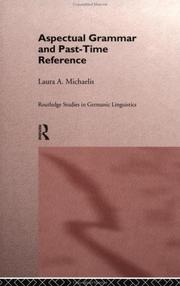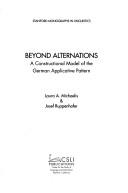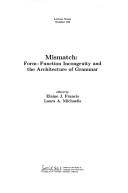| Listing 1 - 10 of 12 | << page >> |
Sort by
|

ISBN: 0415156785 9780415156783 9780203029985 9781134730025 9781134730063 9781134730070 9780415653602 0415653606 0203276051 0203029984 1280330805 9780203276051 1134730063 Year: 1998 Volume: 4 Publisher: London New York Routledge
Abstract | Keywords | Export | Availability | Bookmark
 Loading...
Loading...Choose an application
- Reference Manager
- EndNote
- RefWorks (Direct export to RefWorks)
This study presents a semantic framework for analyzing all aspectual constructions in terms of the event state distinction, and describes the grammatical expression of aspectual meaning in terms of a theory of grammatical constructions. In this theory, grammatical constructions, like words, are conventionalized form-meaning pairs, which are best described not only with respect to their intrinsic semantic values, but also with respect to the functional oppositions in which they participate.
English language --- Grammar --- Espace et temps dans la langue --- Espace et temps dans le langage --- Expression de l'espace et du temps (Linguistique) --- Langage -- Expression de l'espace et du temps --- Ruimte en tijd in de taal --- Space and time in language --- Temps et espace dans le langage --- Grammar, Comparative and general --- Space and time in language. --- Aspect (Linguistique) --- Temporalité (Linguistique) --- Temps (Linguistique) --- Aspect. --- Temporal constructions. --- Tense. --- 801.56 --- Syntaxis. Semantiek --- 801.56 Syntaxis. Semantiek --- Temporalité (Linguistique) --- Language and languages --- Tense (Grammar) --- Temporal constructions (Grammar) --- Aspect (Linguistics) --- Aspect --- Temporal constructions --- Tense --- Syntax --- Verbal aspect --- Verb --- Grammar [Comparative and general ] --- Linguistics --- Philology

ISBN: 1575863308 1575863294 9781575863306 Year: 2001 Publisher: Stanford: CSLI Publications,
Abstract | Keywords | Export | Availability | Bookmark
 Loading...
Loading...Choose an application
- Reference Manager
- EndNote
- RefWorks (Direct export to RefWorks)
Grammar, Comparative and general --- Semantics. --- Verb phrase. --- Syntax. --- Semantics --- Formal semantics --- Semasiology --- Semiology (Semantics) --- Comparative linguistics --- Information theory --- Language and languages --- Lexicology --- Meaning (Psychology) --- Predicate (Grammar) --- Verb phrase --- Syntax --- Phrasal verb --- Predicate --- Verbals --- Linguistics --- Philology --- Grammar, Comparative and general - Verb phrase --- Grammar, Comparative and general - Syntax --- Grammar, Comparative and general Syntax

ISBN: 1575863839 1575863847 9781575863832 9781575863849 Year: 2003 Volume: 163 Publisher: Stanford, Calif.: CSLI,
Abstract | Keywords | Export | Availability | Bookmark
 Loading...
Loading...Choose an application
- Reference Manager
- EndNote
- RefWorks (Direct export to RefWorks)
Linguistic mismatch phenomena involve semiotic functions that attach to forms in defiance of grammatical design features. Noun phrases, when used as predicates, provide one example: how do predicate nominals correspond to our theories of what nouns mean? How do such phenomena challenge traditional conceptions of grammar? How do competing theories of the syntax-semantics interface stand up when confronted with mismatch phenomena? 'Mismatch' addresses these questions through the efforts of some of the most original thinkers in syntactic and semantic theory, exploring a wide variety of mismatch phenomena in a broad sampling of languages.
Lexicology. Semantics --- Grammar --- Grammar, Comparative and general --- Semantics --- Syntax --- Semantics. --- Syntax. --- Grammar, Comparative and general - Syntax
Book
ISBN: 9781108470339 9781108632706 1108470335 9781108455862 1108455867 Year: 2020 Publisher: Cambridge Cambridge University Press
Abstract | Keywords | Export | Availability | Bookmark
 Loading...
Loading...Choose an application
- Reference Manager
- EndNote
- RefWorks (Direct export to RefWorks)
"1.1 Linguistic and syntactic competence We language users believe that we 'know' a language, but the question is what we know when we know a language like English or Korean. It may mean that we know how to create natural English sentences like (1a), but not unnatural sentences like (1b).1 (1) a. We can't pay for health care benefits like this, but you can. b. *We can't keep paying for health care benefits like this, but you can keep.2 In the same way, speakers who know English may accept (2a) and (2c), but not (2b):3 (2) a. Frank sneezed. b. *Frank sneezed the napkin. c. Frank sneezed the napkin off the table. This implies that knowing a language means that (English) speakers have linguistic knowledge sufficient to distinguish between 'acceptable' and 'unacceptable' sentences. However, when speakers are asked to articulate what kind of knowledge allows them to make these distinctions, it is not easy for them to describe it. This knowledge of language, often called linguistic competence, is the ability to speak a language. Knowing one's native language requires neither skill nor talent, but it is nonetheless an accomplishment worthy of investigation"--
Grammar --- English language --- Syntax --- Analysis and parsing --- Diagraming --- Composition and exercises --- Germanic languages

ISBN: 1575861860 Year: 1999 Publisher: Stanford, Calif.
Abstract | Keywords | Export | Availability | Bookmark
 Loading...
Loading...Choose an application
- Reference Manager
- EndNote
- RefWorks (Direct export to RefWorks)
Psycholinguistics --- Grammar --- Cognitive grammar --- Functionalism (Linguistics)
Digital

ISBN: 9783110596656 9783110592993 9783110595512 Year: 2019 Publisher: Berlin ;; Boston De Gruyter Mouton
Abstract | Keywords | Export | Availability | Bookmark
 Loading...
Loading...Choose an application
- Reference Manager
- EndNote
- RefWorks (Direct export to RefWorks)
Book

ISBN: 9783110219074 Year: 2009 Publisher: Berlin Boston
Abstract | Keywords | Export | Availability | Bookmark
 Loading...
Loading...Choose an application
- Reference Manager
- EndNote
- RefWorks (Direct export to RefWorks)
Book

ISBN: 9783110589849 Year: 2019 Publisher: Berlin Boston
Abstract | Keywords | Export | Availability | Bookmark
 Loading...
Loading...Choose an application
- Reference Manager
- EndNote
- RefWorks (Direct export to RefWorks)
Digital

ISBN: 9783110219074 9783110177091 Year: 2009 Publisher: Berlin ;; Boston De Gruyter Mouton
Abstract | Keywords | Export | Availability | Bookmark
 Loading...
Loading...Choose an application
- Reference Manager
- EndNote
- RefWorks (Direct export to RefWorks)
Digital

ISBN: 9783110589849 9783110587296 9783110587234 Year: 2019 Publisher: Berlin ;; Boston De Gruyter Mouton
Abstract | Keywords | Export | Availability | Bookmark
 Loading...
Loading...Choose an application
- Reference Manager
- EndNote
- RefWorks (Direct export to RefWorks)
| Listing 1 - 10 of 12 | << page >> |
Sort by
|

 Search
Search Feedback
Feedback About UniCat
About UniCat  Help
Help News
News